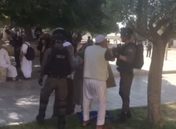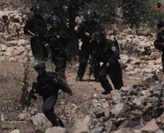27 june 2016
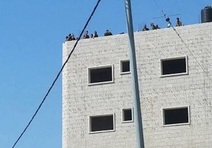
The Israeli Occupation Forces (IOF) occupied Sunday evening a Palestinian-owned building in Hawara town south of Nablus to the north of the West Bank.
Eyewitnesses told the PIC reporter that the occupied building is owned by Abu Farouk Family.
Nearly 50 Israeli soldiers violently stormed the building and informed its owner of their decision to occupy it for three days without revealing the reasons behind the decision.
Several Palestinian buildings in the town were occupied by Israeli forces during the past few days.
Eyewitnesses told the PIC reporter that the occupied building is owned by Abu Farouk Family.
Nearly 50 Israeli soldiers violently stormed the building and informed its owner of their decision to occupy it for three days without revealing the reasons behind the decision.
Several Palestinian buildings in the town were occupied by Israeli forces during the past few days.
“The Al-Aqsa Mosque was calm, and all was fine until nine in the morning, when suddenly, the police opened the Magharba Gate to allow the settlers through,” Khatib stated, “The soldiers and police surrounded dozens of worshipers, and attacked many of them.”
On Sunday evening, the police attacked many Palestinian and international worshipers, detained two Palestinians, and decided to force them out of the Mosque courtyards for several weeks.
The police also decided to deport two British men back to their country, after detaining them in the mosque courtyard. They have been identified as Mohammad Froukh and Julfan Heidjan.
On Sunday evening, the police attacked many Palestinian and international worshipers, detained two Palestinians, and decided to force them out of the Mosque courtyards for several weeks.
The police also decided to deport two British men back to their country, after detaining them in the mosque courtyard. They have been identified as Mohammad Froukh and Julfan Heidjan.
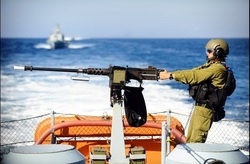
Israeli soldiers, stationed on military towers across the border fence, opened fire, on Monday morning, into Palestinian agricultural lands across the border fence, in the Gaza Strip, while navy ships fired live rounds targeting fishing boats northwest of Gaza city.
The WAFA Palestinian News Agency has reported that the soldiers fired many live rounds into Palestinian agricultural lands, east of Gaza city, forcing the farmers to leave. The attack caused no casualties.
WAFA added that a similar attack targeted farmers on their own lands, east of Deir al-Balah in central Gaza.
In addition, Israeli navy ships fired many live rounds targeting Palestinian fishing boats in the Sudaniyya Sea area, northwest of Gaza City, causing damage to two boats, and forcing the fishers back to shore.
The WAFA Palestinian News Agency has reported that the soldiers fired many live rounds into Palestinian agricultural lands, east of Gaza city, forcing the farmers to leave. The attack caused no casualties.
WAFA added that a similar attack targeted farmers on their own lands, east of Deir al-Balah in central Gaza.
In addition, Israeli navy ships fired many live rounds targeting Palestinian fishing boats in the Sudaniyya Sea area, northwest of Gaza City, causing damage to two boats, and forcing the fishers back to shore.
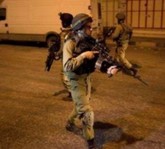
Israeli soldiers have kidnapped, earlier Monday, five Palestinians in the West Bank districts of Hebron and Bethlehem. On Sunday evening, the soldiers kidnapped a Palestinian in occupied Jerusalem.
The Hebron office of the Palestinian Prisoners Society (PPS) has reported that several Israeli military vehicles invaded the Ras al-Joura area, in Hebron city, searched homes and kidnapped Abdul-Qader al-Ayman Qawasmi, 23, and his brother, Sameh, 20.
It added that the soldiers also invaded several neighborhoods in the ath-Thaheriyya area, south of Hebron, and kidnapped Ma’moun Ghazi Qaisiyya.
In addition, the soldiers invaded Teqoua’ town, east of Bethlehem, also searched homes and kidnapped two Palestinians, identified as Moath Ibrahim al-‘Amour, 21, and Shadi Nayef al-‘Amour, 21.
The soldiers also invaded the al-Khader town, south of Bethlehem, and clashed with local youths, who hurled stones on the advancing army vehicles, while the soldiers fired gas bombs and concussion grenades.
On Sunday evening, the soldiers kidnapped a Palestinian woman, identified as Khadija Khweiss Abu Ghalia, from Za’im town, east of Jerusalem, for her activities protesting the ongoing Israeli invasions and provocative tours into the courtyards of the Al-Aqsa Mosque.
The Israeli police in Jerusalem decided to keep Abu Ghalia under interrogation until Tuesday.
The Hebron office of the Palestinian Prisoners Society (PPS) has reported that several Israeli military vehicles invaded the Ras al-Joura area, in Hebron city, searched homes and kidnapped Abdul-Qader al-Ayman Qawasmi, 23, and his brother, Sameh, 20.
It added that the soldiers also invaded several neighborhoods in the ath-Thaheriyya area, south of Hebron, and kidnapped Ma’moun Ghazi Qaisiyya.
In addition, the soldiers invaded Teqoua’ town, east of Bethlehem, also searched homes and kidnapped two Palestinians, identified as Moath Ibrahim al-‘Amour, 21, and Shadi Nayef al-‘Amour, 21.
The soldiers also invaded the al-Khader town, south of Bethlehem, and clashed with local youths, who hurled stones on the advancing army vehicles, while the soldiers fired gas bombs and concussion grenades.
On Sunday evening, the soldiers kidnapped a Palestinian woman, identified as Khadija Khweiss Abu Ghalia, from Za’im town, east of Jerusalem, for her activities protesting the ongoing Israeli invasions and provocative tours into the courtyards of the Al-Aqsa Mosque.
The Israeli police in Jerusalem decided to keep Abu Ghalia under interrogation until Tuesday.
26 june 2016
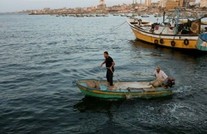
A temporary extension imposed by Israeli authorities, on the designated fishing zone off the coast of the Gaza Strip, expired on Sunday, reducing the zone to six nautical miles after it had been set to nine miles, for one week.
Head of Gaza’s fishermen union Nizar Ayyash told Ma’an News Agency that Israeli authorities, at midnight, confirmed to the union via the Palestinian Ministry of Agriculture that the zone would be reduced.
“A nine-mile zone is already a narrow fishing zone, so can you imagine the challenge when we are forced to sail within six miles,” Ayyash said, adding that fish were abundant only after the nine-mile point from the shore.
Some fishermen said that reducing the fishing zone from nine to six miles would allow only 30 percent of fishermen to go on fishing trips because the area was too narrow for all Gaza fishermen.
Israel’s Coordinator of Government Activities in the Territories COGAT released a statement, last Monday, leading up to the extension, saying that it had been made “on the occasion of Ramadan, and due to abundance of fish this season.”
“We hope that fishermen respect understandings and agreements and do not violate the available fishing area, and to take advantage of this step to benefit the people of Gaza,” the statement added.
Furthermore, Zakariyya Abu Bakr, the head of the Union of Agricultural Workers Committees slammed, on Sunday, Israel’s treatment of fishermen in the Gaza Strip.
“The (Israeli) occupation created a big fuss when they extending the zone to nine nautical miles for the fishermen, though Israeli assaults against fishermen have only increased during that period.”
Israeli gunboats opened fire at Palestinian fishermen on at least one occasion, over the past week, though due the high frequency of such incidents, live fire on fishing boats often go unreported. According to UN documentation, Israeli forces opened fire at Palestinians in Gaza’s border areas on land and sea on at least 22 occasions, between June 14 and 20.
As part of Israel’s blockade off the coastal enclave since 2007, Palestinian fishermen have been required to work within a limited “designated fishing zone.”
The exact limits of the zone are decided by the Israeli authorities and have historically fluctuated, most recently extended to six nautical miles from three, following a ceasefire agreement that ended Israel’s 2014 offensive on the Palestinian territory.
However, the fishing zone was technically set to 20 nautical miles according to the Oslo Accords signed between Israel and the PA in the early 1990s.
The Palestinian Center for Human Rights has reported that Israeli naval forces often open fire on fishermen within these limits, putting their lives in danger on a near-daily basis.
Last year, Israeli naval forces opened fire on Palestinian fishermen at least 139 times, killing three, wounding dozens, and damaging at least 16 fishing boats.
The Israeli army often says, in such circumstances, that the use of live fire is necessary to deter potential “security threats,” a policy which has, in effect, destroyed much of the agricultural and fishing sectors of the impoverished coastal Palestinian territory, which has been under a crippling Israeli blockade since 2007.
Head of Gaza’s fishermen union Nizar Ayyash told Ma’an News Agency that Israeli authorities, at midnight, confirmed to the union via the Palestinian Ministry of Agriculture that the zone would be reduced.
“A nine-mile zone is already a narrow fishing zone, so can you imagine the challenge when we are forced to sail within six miles,” Ayyash said, adding that fish were abundant only after the nine-mile point from the shore.
Some fishermen said that reducing the fishing zone from nine to six miles would allow only 30 percent of fishermen to go on fishing trips because the area was too narrow for all Gaza fishermen.
Israel’s Coordinator of Government Activities in the Territories COGAT released a statement, last Monday, leading up to the extension, saying that it had been made “on the occasion of Ramadan, and due to abundance of fish this season.”
“We hope that fishermen respect understandings and agreements and do not violate the available fishing area, and to take advantage of this step to benefit the people of Gaza,” the statement added.
Furthermore, Zakariyya Abu Bakr, the head of the Union of Agricultural Workers Committees slammed, on Sunday, Israel’s treatment of fishermen in the Gaza Strip.
“The (Israeli) occupation created a big fuss when they extending the zone to nine nautical miles for the fishermen, though Israeli assaults against fishermen have only increased during that period.”
Israeli gunboats opened fire at Palestinian fishermen on at least one occasion, over the past week, though due the high frequency of such incidents, live fire on fishing boats often go unreported. According to UN documentation, Israeli forces opened fire at Palestinians in Gaza’s border areas on land and sea on at least 22 occasions, between June 14 and 20.
As part of Israel’s blockade off the coastal enclave since 2007, Palestinian fishermen have been required to work within a limited “designated fishing zone.”
The exact limits of the zone are decided by the Israeli authorities and have historically fluctuated, most recently extended to six nautical miles from three, following a ceasefire agreement that ended Israel’s 2014 offensive on the Palestinian territory.
However, the fishing zone was technically set to 20 nautical miles according to the Oslo Accords signed between Israel and the PA in the early 1990s.
The Palestinian Center for Human Rights has reported that Israeli naval forces often open fire on fishermen within these limits, putting their lives in danger on a near-daily basis.
Last year, Israeli naval forces opened fire on Palestinian fishermen at least 139 times, killing three, wounding dozens, and damaging at least 16 fishing boats.
The Israeli army often says, in such circumstances, that the use of live fire is necessary to deter potential “security threats,” a policy which has, in effect, destroyed much of the agricultural and fishing sectors of the impoverished coastal Palestinian territory, which has been under a crippling Israeli blockade since 2007.
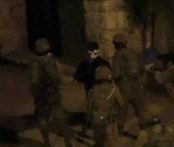
Israeli soldiers kidnapped, overnight and on Sunday morning, at least eleven Palestinians in different parts of the occupied West Bank, and detained three South Africans, in the Al-Aqsa Mosque, in occupied Jerusalem. Five Palestinians were injured in Al-Aqsa courtyards. Video: Army Attack Worshipers In Al-Aqsa.
The Bethlehem office of the Palestinian Prisoners’ Society (PPS) has reported that the soldiers invaded al-Khader and Nahhalin towns, searched many homes and kidnapped four Palestinians identified as Bassam Na’im al-Balboul, Nassar Mohammad Nassar, Fares Yousef an-Niess and Noureddin Mohammad Shakarna.
The soldiers also invaded the central West Bank district of Tubas and kidnapped three Palestinians, identified as Rabea’ Mustafa Shafe’ey, Husam Hammad Abu Zeina and Hussein Daraghma.
In Ramallah, the soldiers searched a few homes and kidnapped a Palestinian, identified as ‘Eid Tal’at Rimawi, 23, from Beit Rima town.
In occupied Jerusalem, the soldiers kidnapped Saleh Bader Abu ‘Assab and Mohammad Naseef, in addition to three South African men, and one Palestinian from Jenin, protesting ongoing Israeli invasions into the Al-Aqsa Mosque.
Dozens of Israeli soldiers and fanatic settlers stormed the courtyards of the Al-Aqsa mosque, before the army assaulted many worshipers who protested the provocative tour.
The soldiers prevented all worshipers below the age of 30 from entering the mosque, and opened the al-Magharba Gate to allow dozens of Israeli extremists into the courtyards. The mosque was only opened to Muslim worshipers after 11:30 before noon.
At least five persons were injured during ensuing clashes between the worshipers and the invading soldiers. The wounded were moved to the Al-Makassed Hospital in Jerusalem.
The Bethlehem office of the Palestinian Prisoners’ Society (PPS) has reported that the soldiers invaded al-Khader and Nahhalin towns, searched many homes and kidnapped four Palestinians identified as Bassam Na’im al-Balboul, Nassar Mohammad Nassar, Fares Yousef an-Niess and Noureddin Mohammad Shakarna.
The soldiers also invaded the central West Bank district of Tubas and kidnapped three Palestinians, identified as Rabea’ Mustafa Shafe’ey, Husam Hammad Abu Zeina and Hussein Daraghma.
In Ramallah, the soldiers searched a few homes and kidnapped a Palestinian, identified as ‘Eid Tal’at Rimawi, 23, from Beit Rima town.
In occupied Jerusalem, the soldiers kidnapped Saleh Bader Abu ‘Assab and Mohammad Naseef, in addition to three South African men, and one Palestinian from Jenin, protesting ongoing Israeli invasions into the Al-Aqsa Mosque.
Dozens of Israeli soldiers and fanatic settlers stormed the courtyards of the Al-Aqsa mosque, before the army assaulted many worshipers who protested the provocative tour.
The soldiers prevented all worshipers below the age of 30 from entering the mosque, and opened the al-Magharba Gate to allow dozens of Israeli extremists into the courtyards. The mosque was only opened to Muslim worshipers after 11:30 before noon.
At least five persons were injured during ensuing clashes between the worshipers and the invading soldiers. The wounded were moved to the Al-Makassed Hospital in Jerusalem.
25 june 2016
The residents in Kufur Qaddoum started their weekly marches in June 2011, protesting the closure of the village’s main road, that was completely sealed by the army in 2003, in order to enable easy access to Kedumim illegal colony, built on privately-owned Palestinian lands.
Also on Friday, many residents of Bil’in village, west of the central West Bank district of Ramallah, held the weekly nonviolent protest, accompanied by Israeli and international peace activists.
Also on Friday, many residents of Bil’in village, west of the central West Bank district of Ramallah, held the weekly nonviolent protest, accompanied by Israeli and international peace activists.
24 june 2016
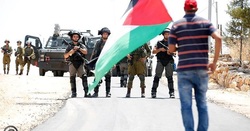
Violent clashes broke out Friday afternoon across the West Bank after Israeli occupation forces brutally suppressed the Palestinian anti-occupation weekly marches.
Hundreds of locals and foreign activists participated in the West Bank weekly marches demanding an end to Israeli occupation and settlement construction.
In Ramallah, dozens of Palestinians marched in Bil’in town, east of the city, calling for an end to Israeli confiscation policy against their agricultural lands.
The participants held Palestinian flags and raised photos of the Palestinian child Mahmoud Badran who was shot and killed by Israeli forces few days ago.
The clashes broke out when IOF soldiers violently attacked the participants. No injuries or arrests were reported.
In Qalqilia, Israeli forces suppressed Kafer Qaddum village's weekly march that calls for the opening of a road closed by the IOF for more than 13 years.
Local activist Murad Shteiwi said that Israeli forces fired teargas bombs and rubber bullets at the participants. No injuries were reported.
Hundreds of locals and foreign activists participated in the West Bank weekly marches demanding an end to Israeli occupation and settlement construction.
In Ramallah, dozens of Palestinians marched in Bil’in town, east of the city, calling for an end to Israeli confiscation policy against their agricultural lands.
The participants held Palestinian flags and raised photos of the Palestinian child Mahmoud Badran who was shot and killed by Israeli forces few days ago.
The clashes broke out when IOF soldiers violently attacked the participants. No injuries or arrests were reported.
In Qalqilia, Israeli forces suppressed Kafer Qaddum village's weekly march that calls for the opening of a road closed by the IOF for more than 13 years.
Local activist Murad Shteiwi said that Israeli forces fired teargas bombs and rubber bullets at the participants. No injuries were reported.
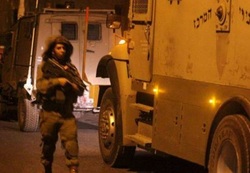
Israeli soldiers confiscated, overnight and on Friday at dawn, several surveillance tapes and cameras owned by store owners in Doha town, west of the West Bank city of Bethlehem.
The soldiers invaded the center of the town, especially its main road, and started inspecting surveillance tapes and cameras, before confiscating many of them.
Many youngsters hurled s and empty bottles on the invading military vehicles, while the army fired several gas bombs, and live rounds.
Medical sources said many Palestinians suffered the effects of tear gas inhalation, and received the needed treatment, without the need for hospitalization.
The soldiers invaded the center of the town, especially its main road, and started inspecting surveillance tapes and cameras, before confiscating many of them.
Many youngsters hurled s and empty bottles on the invading military vehicles, while the army fired several gas bombs, and live rounds.
Medical sources said many Palestinians suffered the effects of tear gas inhalation, and received the needed treatment, without the need for hospitalization.
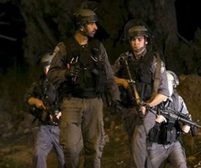
Israeli soldiers invaded, late on Thursday evening, Doha town, west of the West Bank city of Bethlehem, and shot a young Palestinian man, during clashes that took place following the invasion.
Medical sources said a young man, 21, was shot with a live round in his leg, and was moved to a local hospital, suffering a moderate injury.
The soldiers fired many live rounds, gas bombs and concussion grenades, causing fires in many trees and farmlands, before Palestinian firefighters, and Civil Defense teams, rushed to the site and extinguished the fires.
IOF sets fire to Palestinian-owned lands
Palestinian-owned agricultural lands, south of Bethlehem, were gutted by fire late Friday when the Israeli Occupation Forces (IOF) heavily fired teargas bombs in the surrounding areas.
Security sources affirmed that Israeli forces heavily fired flare bombs west of al-Khuder town, south of Bethlehem, which led to the outbreak of fire in the area. Palestinian civil defense crews managed to control the fire and put it out.
Medical sources said a young man, 21, was shot with a live round in his leg, and was moved to a local hospital, suffering a moderate injury.
The soldiers fired many live rounds, gas bombs and concussion grenades, causing fires in many trees and farmlands, before Palestinian firefighters, and Civil Defense teams, rushed to the site and extinguished the fires.
IOF sets fire to Palestinian-owned lands
Palestinian-owned agricultural lands, south of Bethlehem, were gutted by fire late Friday when the Israeli Occupation Forces (IOF) heavily fired teargas bombs in the surrounding areas.
Security sources affirmed that Israeli forces heavily fired flare bombs west of al-Khuder town, south of Bethlehem, which led to the outbreak of fire in the area. Palestinian civil defense crews managed to control the fire and put it out.
23 june 2016
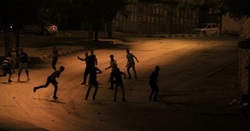
A number of Palestinians were kidnapped and others were injured by the Israeli occupation forces (IOF) at predawn time on Thursday in a West Bank assault.
The Israeli occupation army claimed responsibility for the abduction of five Palestinians from the West Bank on account of their involvement in anti-occupation activism.
Several Palestinian civilians choked on teargas after the IOF rolled into Qalqilya and wreaked havoc on civilian homes and fired teargas canisters at random.
The occupation troops stormed the city at the crack of dawn and ravaged commercial shops, sparking violent clashes with the Palestinians. Two Palestinian citizens were kidnapped by the IOF from the city.
The father of journalist Naser al-Khaseeb was kidnapped by the IOF from his own family home in Ramallah’s northern town of Aroura. Naser was arrested a few days earlier from the Birzeit University, where he teaches.
The IOF further kidnapped an unidentified youth from northern Ramallah. The Israeli military forces also stormed Bethlehem’s towns of al-Abidiyeh, to the northeast, and al-Khader, to the west, before they kidnapped a youngster.
Violent clashes burst out near the international Khader stadium after the IOF targeted civilians with teargas canisters. The IOF stormed Nablus and raked through residential neighborhoods in search for Palestinian anti-occupation activists.
Palestinian youth Aseed Rayhan was kidnapped by the Israeli soldiers from Tel town at predawn time on his way to the al-Aqsa Mosque to perform his prayers. Palestinian citizen Muhammad Akram al-Jubari was also kidnapped by the IOF from al-Khalil province.
The campaign culminated in the abduction of another Palestinian citizen from his own family home in Occupied Jerusalem.
The Israeli occupation army claimed responsibility for the abduction of five Palestinians from the West Bank on account of their involvement in anti-occupation activism.
Several Palestinian civilians choked on teargas after the IOF rolled into Qalqilya and wreaked havoc on civilian homes and fired teargas canisters at random.
The occupation troops stormed the city at the crack of dawn and ravaged commercial shops, sparking violent clashes with the Palestinians. Two Palestinian citizens were kidnapped by the IOF from the city.
The father of journalist Naser al-Khaseeb was kidnapped by the IOF from his own family home in Ramallah’s northern town of Aroura. Naser was arrested a few days earlier from the Birzeit University, where he teaches.
The IOF further kidnapped an unidentified youth from northern Ramallah. The Israeli military forces also stormed Bethlehem’s towns of al-Abidiyeh, to the northeast, and al-Khader, to the west, before they kidnapped a youngster.
Violent clashes burst out near the international Khader stadium after the IOF targeted civilians with teargas canisters. The IOF stormed Nablus and raked through residential neighborhoods in search for Palestinian anti-occupation activists.
Palestinian youth Aseed Rayhan was kidnapped by the Israeli soldiers from Tel town at predawn time on his way to the al-Aqsa Mosque to perform his prayers. Palestinian citizen Muhammad Akram al-Jubari was also kidnapped by the IOF from al-Khalil province.
The campaign culminated in the abduction of another Palestinian citizen from his own family home in Occupied Jerusalem.
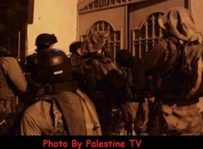
Israeli soldiers invaded, on Thursday at dawn, Qalqilia city in the northern part of the occupied West Bank, searched many homes and stores, and kidnapped two Palestinians.
The soldiers violently searched many homes after invading them, and interrogated several Palestinians.
Local sources said the soldiers kidnapped two Palestinians, identified as Omar Mohammad Qashmar and Ali Daoud, and took them to an unknown destination.
The soldiers also invaded several stores in the city and searched them, in addition to firing gas bombs in several neighborhoods.
The soldiers violently searched many homes after invading them, and interrogated several Palestinians.
Local sources said the soldiers kidnapped two Palestinians, identified as Omar Mohammad Qashmar and Ali Daoud, and took them to an unknown destination.
The soldiers also invaded several stores in the city and searched them, in addition to firing gas bombs in several neighborhoods.
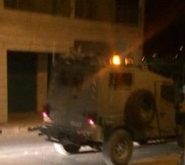
Palestinian medical sources have reported that two workers were injured, on Thursday morning, after Israeli soldiers assaulted them, near Bethlehem, while trying to enter occupied Jerusalem for work.
The sources said that the two workers are from the al-’Obeydiyya town, east of Bethlehem, and have been identified as Mohammad Jamil Radayda, 22, Jihad Jamal Radayda, 21.
The soldiers chased and assaulted them in Wadi Abu al-Hummus area, near the al-Khass village, east of Bethlehem. The army claimed that the two workers were trying to enter Jerusalem without a permit.
The two were repeatedly hit and kicked by the soldiers, and suffered various fractures, cuts and bruises to different parts of their bodies, and were transferred to Beit Jala governmental hospital, suffered moderate injuries.
It is worth mentioning that Wadi Abu al-Hummus area became a site of repeated Israeli military assaults against dozens of workers, including some who were recently shot and injured.
The sources said that the two workers are from the al-’Obeydiyya town, east of Bethlehem, and have been identified as Mohammad Jamil Radayda, 22, Jihad Jamal Radayda, 21.
The soldiers chased and assaulted them in Wadi Abu al-Hummus area, near the al-Khass village, east of Bethlehem. The army claimed that the two workers were trying to enter Jerusalem without a permit.
The two were repeatedly hit and kicked by the soldiers, and suffered various fractures, cuts and bruises to different parts of their bodies, and were transferred to Beit Jala governmental hospital, suffered moderate injuries.
It is worth mentioning that Wadi Abu al-Hummus area became a site of repeated Israeli military assaults against dozens of workers, including some who were recently shot and injured.
22 june 2016
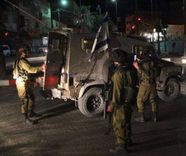
Israeli soldiers invaded, on Wednesday at dawn, various communities in the occupied West Bank, searched homes and kidnapped at least thirteen Palestinians, including a security officer.
The Palestinian Prisoners Society (PPS) said the soldiers invaded Tubas city, in central West Bank, violently searched homes and kidnapped a young man, identified as Baha’ Nidal Kharraz.
It added that the soldiers invaded Deir al-Hatab village, east of the northern West Bank city of Nablus, and kidnapped Husam Zeid Qassem Hussein, 22, after storming and searching his family home.
Media sources in Nablus said the soldiers invaded several homes in the Dahia area, in Nablus, after damaging their front doors, before searching them and ransacking their property.
The soldiers destroyed and removed windows and doors of the invaded homes, and damaged electric equipment.
The sources added that the soldiers closed the road leading to a local mosque, and prevented the Palestinians from reaching it for dawn prayers.
The attack led to clashes between several local youths, who hurled stones on the soldiers, and the soldiers who fired many gas bombs and concussion grenades.
The soldiers also kidnapped a young man, identified as Ahmad Awni Jaber, 30, from Ektaba area, east of the northern West Bank city of Tulkarem, after stopping him on the Za’tara roadblock, south of Nablus.
Furthermore, the soldiers invaded Beit Fajjar town, south of Bethlehem, and searched homes before kidnapping two Palestinians, identified as Malek Akram Taqatqa, 18, and Bara’ Nabil Thawabta, 18.
Also, several military vehicles invaded Budrus village, northeast of the central West Bank city of Ramallah, and kidnapped Mo’in Lutfi Khalaf, 27, after searching his home, causing excessive damage.
The soldiers also invaded several villages, west of Ramallah, including Ni’lin, and fired flares, in addition to gas bombs and concussion grenades, while a number of local youths hurled stones at the invading vehicles.
In addition, the Hebron office of the PPS, in the southern part of the West Bank, said the soldiers invaded Yatta, Surif and Doura towns, and Kharsa village, violently searched many homes, and kidnapped Mahmoud Khalil Abu Awad, 27, from Kharsa.
The Palestinian Prisoners Society (PPS) said the soldiers invaded Tubas city, in central West Bank, violently searched homes and kidnapped a young man, identified as Baha’ Nidal Kharraz.
It added that the soldiers invaded Deir al-Hatab village, east of the northern West Bank city of Nablus, and kidnapped Husam Zeid Qassem Hussein, 22, after storming and searching his family home.
Media sources in Nablus said the soldiers invaded several homes in the Dahia area, in Nablus, after damaging their front doors, before searching them and ransacking their property.
The soldiers destroyed and removed windows and doors of the invaded homes, and damaged electric equipment.
The sources added that the soldiers closed the road leading to a local mosque, and prevented the Palestinians from reaching it for dawn prayers.
The attack led to clashes between several local youths, who hurled stones on the soldiers, and the soldiers who fired many gas bombs and concussion grenades.
The soldiers also kidnapped a young man, identified as Ahmad Awni Jaber, 30, from Ektaba area, east of the northern West Bank city of Tulkarem, after stopping him on the Za’tara roadblock, south of Nablus.
Furthermore, the soldiers invaded Beit Fajjar town, south of Bethlehem, and searched homes before kidnapping two Palestinians, identified as Malek Akram Taqatqa, 18, and Bara’ Nabil Thawabta, 18.
Also, several military vehicles invaded Budrus village, northeast of the central West Bank city of Ramallah, and kidnapped Mo’in Lutfi Khalaf, 27, after searching his home, causing excessive damage.
The soldiers also invaded several villages, west of Ramallah, including Ni’lin, and fired flares, in addition to gas bombs and concussion grenades, while a number of local youths hurled stones at the invading vehicles.
In addition, the Hebron office of the PPS, in the southern part of the West Bank, said the soldiers invaded Yatta, Surif and Doura towns, and Kharsa village, violently searched many homes, and kidnapped Mahmoud Khalil Abu Awad, 27, from Kharsa.
